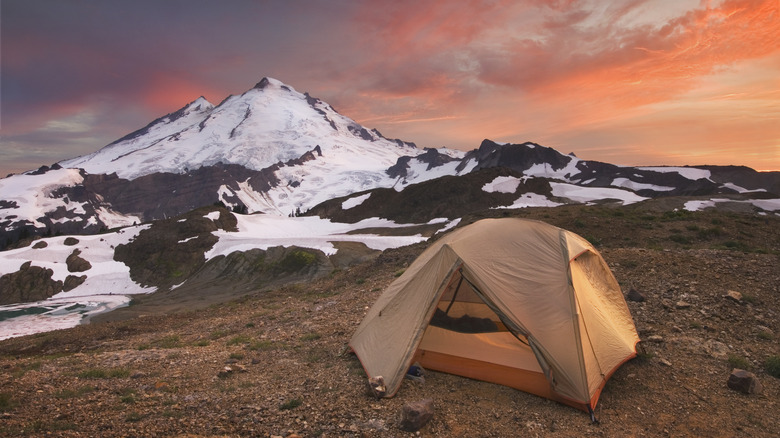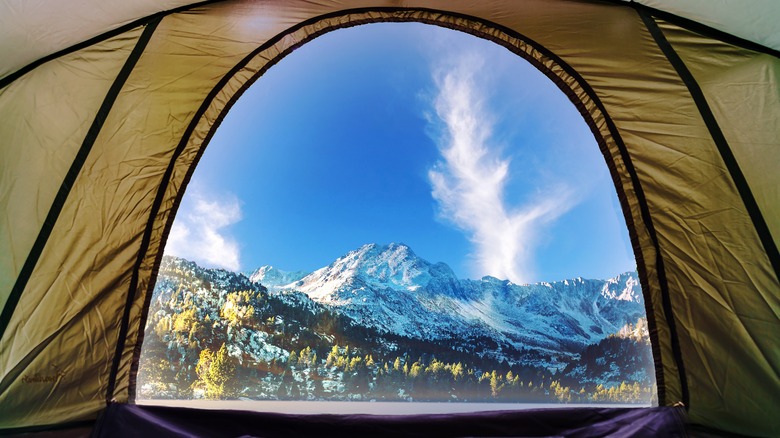The Best Apps For Finding Free Campsites
How much would you be willing to pay for a campsite? In popular places, rates soar to hundreds of dollars per night — pretty steep for a parking spot. While those places tend to have resort-style amenities, the lure of a cheap vacation is one of the main reasons many people go camping. Luckily, there are tons of apps to help you find free campsites all over the U.S. and beyond. While the campsites don't have all the bells and whistles of the more expensive sites, they do tend to offer peace and quiet in glorious solitude. Plus, these apps can be lifesavers if you arrive at an established campsite that's fully booked.
One of the top apps for finding free places to spend the night in an RV or with a tent is iOverlander 2, a newer iteration of the long-established iOverlander. This app shows thousands of campsites in the U.S. alone, and you can filter based on your preferences, from established campgrounds to wild camping and short-term parking spots. All iOverlander content is user-generated; that means someone has been there before you, so you won't be discovering a totally new place to camp.
However, it also means that overnight stops have reviews and often photos, so you can benefit from firsthand experiences. In addition, the app shows you the last time a place was "verified" by a user, so you know you're heading to a legitimate spot. There are both free and paid versions (with additional features) available.
Two of the best apps to find free campsites
Another brilliant app for finding free camping is The Dyrt. This app claims to show more U.S. campgrounds than any other, with thousands to choose from. The free version of the app and website allows you to search by location and browse a map, allowing you to find some free sites. But to unlock all of the features, including a free campsite filter, you'll need the pro version, which costs $2.99 per month, billed annually. Like with iOverlander, users contribute reviews and photos to The Dyrt, giving you a detailed view of your destination. The app also shows available facilities, how good (or bad) the cell service is and how you can access the site.
The next app on our list is Roadtrippers, which owns Campendium. Don't download the Campendium app — it simply tells you that the app no longer exists after you've installed it! Download Roadtrippers instead, or go to the website and click on the Campendium category. The map will light up with campsites, and you can filter by price (all the way down to free) and whether you're looking for public lands, dump stations and more. Again, users can add reviews and photos, and details of cell coverage and amenities are shown. For even more features, such as overnight RV parking and RV-safe routes, consider becoming a member for $59.99 per year.
Blaze your own trail
So far, the apps we've talked about show places your fellow campers have already visited. More adventurous travelers might want to forge their own paths, and there's one particularly handy app to help you do that. Gaia GPS is one way to find free camping in America's National Forests, where dispersed camping is permitted.
We're not going to lie: Gaia GPS can be tricky to use at first. (See this Reddit post in the r/overlander forum titled "How the he** do I use Gaia GPS?") But don't be put off! Gaia has a whole post on their blog about how to search for places you're allowed to camp, including which map overlays to choose and what exactly you're looking for. To overlay maps, you'll need the Gaia premium subscription, which costs $59.90. Note that Gaia will only show you the type of land in a certain area; you need to check the rules around spending the night there.
Redditor u/Roadkill_Bingo loves Gaia for the sense of adventure it creates, writing, "The whole fun of dispersed camping is scouting possible spots on your map ahead of time and seeing if they pan out. There wouldn't be any gems if they were advertised on a map." Wherever you camp, whether you're in the wild or on an established site, remember to do these things before leaving your campsite to preserve the site for others.


